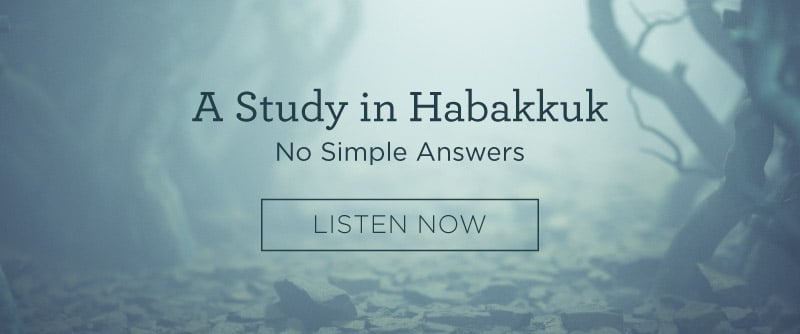
Although the prophet Habakkuk lived more than 2,500 years ago, the book that bears his name begins with an issue that is relevant in every age and in every culture: God’s apparent inactivity in the face of injustice, violence, and destruction.
In the book’s opening verses, we’re introduced to a faith-filled yet weary prophet:
O LORD, how long shall I cry for help,
and you will not hear?
Or cry to you “Violence!”
and you will not save? (v. 2)
Habakkuk’s been praying but has become increasingly disheartened. His complaints have to do with God’s timing and tolerance. Familiar with God’s word to Israel in Deuteronomy 28, in which God promised that judgment would follow His people’s covenant disobedience, Habakkuk appeals to God to make good on His promise. Grieved by God’s apparent lenience toward Israel’s wickedness (vv. 3–4), the prophet essentially asks, “How long until You act?”
We can understand why Habakkuk was grieved. He lived during a period of great spiritual darkness in Israel and is believed to have been a younger contemporary of Jeremiah and a subject under king Jehoiakim. We read some about Jehoiakim’s royal malpractice in Jeremiah 22:
Woe to him who builds his house by unrighteousness,
and his upper rooms by injustice,
who makes his neighbor serve him for nothing
and does not give him his wages ….
… You have eyes and heart
only for your dishonest gain,
for shedding innocent blood,
and for practicing oppression and violence. (vv. 13, 17)
The context that Jeremiah’s prophecy lends to Habakkuk is staggering, bringing a greater depth of meaning to his complaint in verse 4: “The law is paralyzed, and justice never goes forth.” As understandable as his complaint was, though, Habakkuk still needed to learn to trust God’s work in the world—especially since he hadn’t begun to understand all that was taking place.
God’s people today must also learn this vital skill—and the Spirit-inspired prophecy of Habakkuk is a qualified instructor for us. Habakkuk reminds us that God works in the world, regardless of time and place. We can discern this work through three topics connected to chapter 1: the revelation that God discloses, the answer that Habakkuk gives, and the fulfillment that Jesus provides.
God’s Revelation
In 1:6, God answers Habakkuk’s complaint in an unbelievable manner: “Behold, I am raising up the Chaldeans.” The Chaldeans—or “the Babylonians” in some translations—were a notorious geopolitical power in their day. They had sacked Assur in 614 BC and Nineveh in 612, and in 605 they had besieged Egypt in the historic Battle of Carchemish. And now God discloses that Babylon is heading toward Judah.
We must bring the questions of judgment, justice, and mercy to the foot of the cross.
Though this news was doubtlessly devastating, it’s remarkable to pause and reflect on the fact that all of these historical events unfolded under God’s sovereign control. As powerful as the Babylonians were, they were merely instruments in God’s hand. He would raise Babylon up, and He would hold them accountable for their wickedness (1:6; 2:12). Even in reading of such a severe judgment we can take comfort, for the events of our day are no less under God’s control than they were in Habakkuk’s. God doesn’t watch and wait for history to progress. Instead, He’s actively involved in the affairs of the world and of every individual (Matt. 10:29–30).
The wonder of it all is that even though the prophet didn’t yet see it, God was at work. God again reminded Habakkuk that Babylon’s rise ultimately would be due not to their political prowess but to divine design.
Like Habakkuk in his day, even when we can’t see it, God is at work . we’re dependent on God to open our eyes and enable us to discern the work of His hand in our broken world. We can’t perceive it through deduction but only through revelation. At the same time, we should acknowledge that we won’t always understand what God is doing or why He’s doing it. His designs are different from ours. He doesn’t think as we do. And so it’s good to say with the hymn writer,
Deep in unfathomable mines
Of never-failing skill
He treasures up his bright designs
And works His sovereign will.1
Habakkuk’s Answer
The revelation that God disclosed to Habakkuk wasn’t what the prophet expected, leading him to counter with another complaint in verses 12–17. There, the prophet calls into question God’s character, as if to say that the cure God prescribed was worse than the disease:
You who are of purer eyes than to see evil
and cannot look at wrong,
why do you idly look at traitors
and remain silent when the wicked swallows up
the man more righteous than he? (v. 13)
We can perhaps sense some spiritual pride in Habakkuk—or, at the very least, ignorance: “You mean to say, Lord, that You’re going to use the really evil Babylonians to punish the moderately evil Israelites?”
The prophet expounds on what he perceives to be the problem in the closing verses of chapter 1, likening God’s people to “fish of the sea,” men and women who are floating along without rudder and without ruler (v. 14). It’s an apt metaphor given Babylon’s culture: the nation was settled between the Tigris and Euphrates rivers and bordered by the Persian Gulf, making fishing essential commerce. History tells us that to demonstrate their power and perpetuate their influence, their rulers would drag their captives away in fish nets. This is the picture Habakkuk employs in verses 15–17:
He brings all of them up with a hook;
he drags them out with his net;
he gathers them in his dragnet;
so he rejoices and is glad.
Therefore he sacrifices to his net
and makes offerings to his dragnet;
for by them he lives in luxury,
and his food is rich.
Is he then to keep on emptying his net
and mercilessly killing nations forever?
In other words, the prophet claims that God, in His judgment, has made His people vulnerable to the worst kinds of Babylonian exploitation.
When we read Habakkuk, we should be struck by the severity of God’s judgment against Israel. But we should also remember that God’s people were responsible for the judgment coming their way. It was a consequence for their own sin—that which was described in verses 2–4 and which was the basis for Habakkuk’s complaint in the first place. Really, chapter 1 is a picture of personal responsibility for sin. Among God’s people there was violence, destruction, and wickedness. They had broken the covenant with their God. And so it was fitting that God would make good on His promise to punish their covenant disobedience. Indeed, it was just.
Christ’s Fulfillment
Habakkuk’s questions about God’s presence in the face of evil are answered not ultimately within his writing or his time but beyond it. If we wish to get the solutions for the fundamental issues raised in the book—the questions of God’s dealing with injustice, His providing necessary judgment while remaining true to His character, His delight in showing mercy, etc.—then we must look beyond Habakkuk to Jesus Christ. Ultimately, we must bring the questions of judgment, justice, and mercy to the foot of the cross.
John Stott once remarked, “I could never myself believe in God, if it were not for the cross.”2 It’s in the cross that God deals with the weightiest matters of our existence: the Son dying for those who hate Him and, in His death, praying for His enemies. We can be certain that all of Habakkuk’s moral and intellectual dilemmas, as well as our own, are adequately addressed in the cross of Christ. And with the perspective of the cross, we look forward to the day when all wickedness will be vanquished. The apostle John describes that scene:
I heard a loud voice from the throne saying, “Behold, the dwelling place of God is with man. He will dwell with them, and they will be his people, and God himself will be with them as their God. He will wipe away every tear from their eyes, and death shall be no more, neither shall there be mourning, nor crying, nor pain anymore, for the former things have passed away.” (Rev. 21:3–4)
Until that day, while we wait, we live by faith (Hab. 2:4).
This article was adapted from the sermon “‘Look and Be Amazed!’” by Alistair Begg.
Topics: Articles
